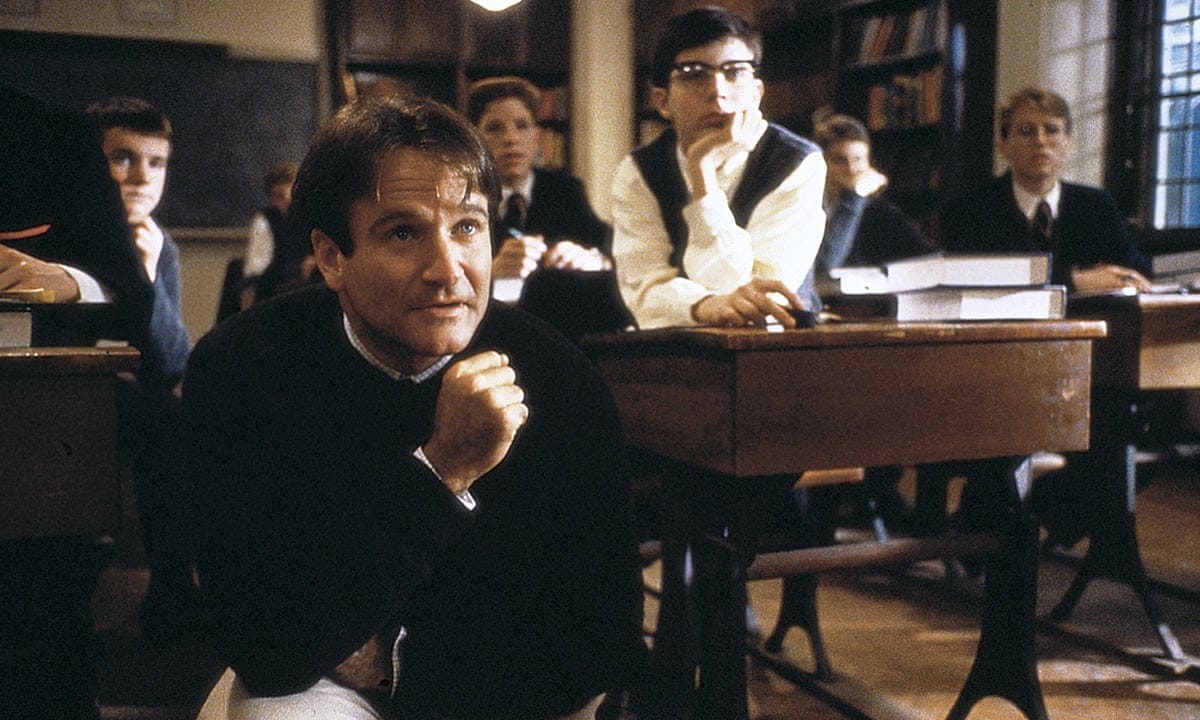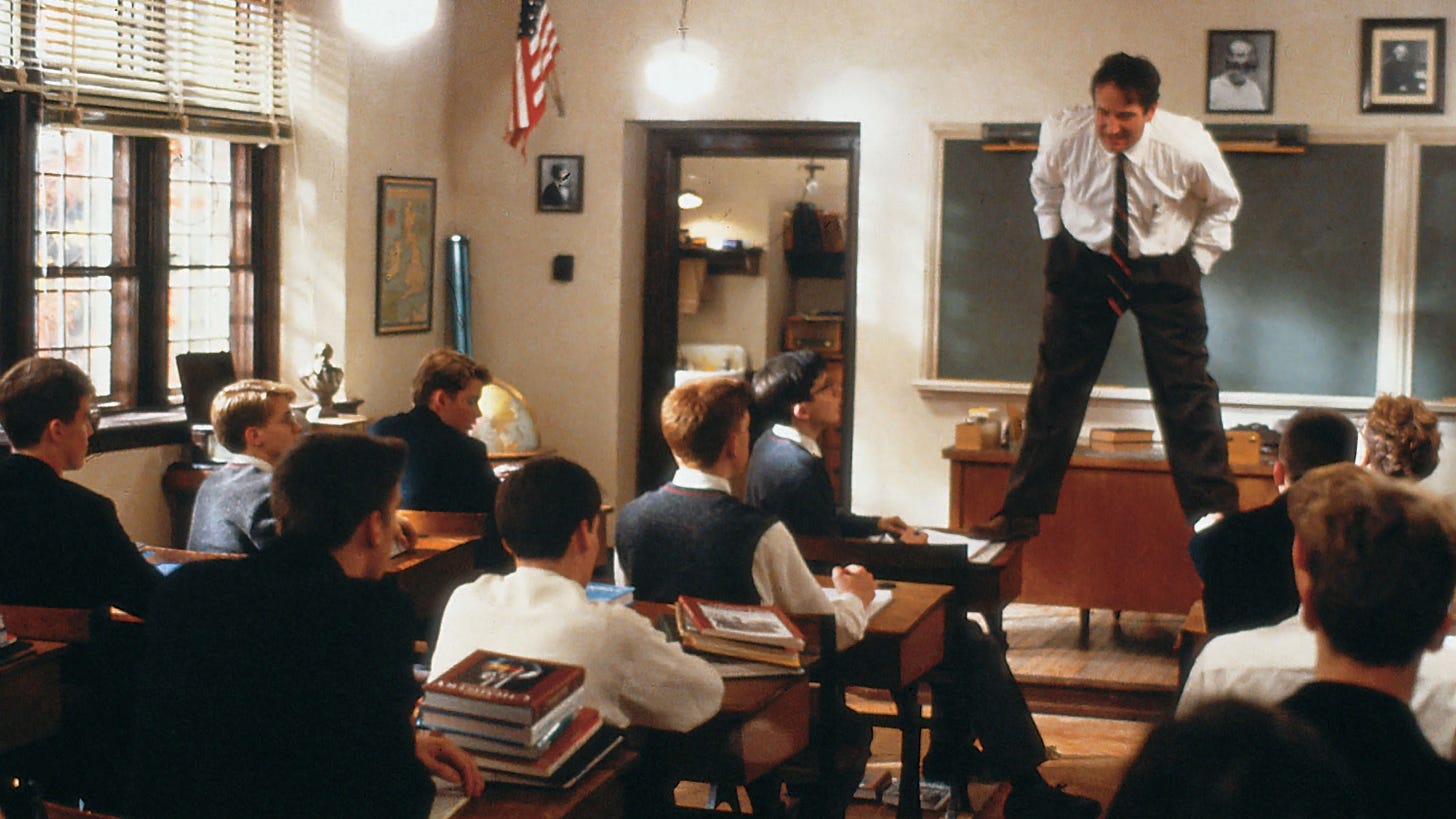Keating: The Philosophy of a Great Mentor
How Professor John Keating continues to inspire generation after generation in "Dead Poets Society".
Professor John Keating, portrayed by the always brilliant Robin Williams in Dead Poets Society, remains one of the most beloved figures in cinematic history. Why? Because he embodies everything we hope for in a great mentor—someone who doesn’t just teach from the textbook but awakens something dormant within us. Keating stands out not because of rigid lectures or lofty intellectualism, but because of the passion and belief he brings to the classroom. His fundamental message is that education should focus on development rather than memorization, encompassing both intellectual and personal growth. This belief, centered on happiness and inquisitiveness, continues to be relevant in the present day.
The key to being a truly memorable professor is not the quantity of information they teach, but rather the impact they have on their students' emotions. Exceptional mentors inspire a feeling of potential. Keating illustrates this point by urging his students to change their perspectives—such as standing on desks, tearing pages from textbooks, and reciting poetry loudly. The main idea is clear: education isn't about uniformity; it's about learning to think independently, to perceive the world with open eyes, and, most importantly, to discover your own voice. Passion, in this context, is the key element of effective teaching. When a teacher is fully committed to both the subject matter and the development of their students, learning becomes infectious, a shared journey of exploration.
In Pedagogy of the Oppressed, Paulo Freire's philosophy aligns with Keating's teaching legacy. Freire advocated for education to be a collaborative process rather than a one-way transmission of information, emphasizing the importance of teachers and students learning together. He believed that educators should not simply impart knowledge to passive students but should instead encourage critical thinking and dialogue. Keating shares this philosophy, as he creates an environment for his students to explore, reflect, and question societal norms rather than simply memorizing facts. His students don't just learn about poetry; they experience it firsthand.
Keating understands that effective teaching involves personally investing in students' success and development. Even when students lack confidence in themselves, he believes in them. His famous phrase "Carpe Diem, seize the day" is not just a meaningless slogan, but a call to action, encouraging students to realize their potential and embrace life's uncertainties. He teaches not for personal recognition, but to ensure that his students feel acknowledged and appreciated, and understand that their lives hold significance beyond academic accomplishments. The beauty of Keating’s mentorship lies in his ability to see more in his students than they see in themselves—a hallmark of all great mentors, someone who sees people and is more than willing to enhance them to greater lengths. Someone who understands potential is not only vision, but it can be a reality most deserving to all of those who seek it.
Keating and Freire both believe that education should awaken consciousness, rather than passively mold students. They both oppose traditional authoritarian teaching and advocate for a participatory approach. In Keating's classroom and Freire’s “problem-posing” education model, students actively engage with ideas, questioning and interpreting the world around them. In both approaches, the teacher's role is to spark curiosity and cultivate independent thought, rather than dictating answers. Keating’s poetic exercises and Freire’s dialogues both encourage students to embrace learning as a collaborative act of exploration, breaking free from the fear of failure. This shared philosophy of liberation through education creates an environment where students not only achieve academic success but also begin to discover their identity and values. Both Keating and Freire emphasize that learning is about reclaiming agency and imagining new possibilities for one’s life, not just knowing facts.
The education, as highlighted by Freire, is of course, a means of liberation, a transformative process for both the student and the teacher. Similarly, Keating's approach to teaching is groundbreaking as it doesn't just impart knowledge; it grants freedom—the freedom to critically analyze, deeply feel, and boldly act. However, teaching with such radical passion carries its risks. The downfall of Keating in the movie illustrates that being a mentor involves treading a fine line. Not everyone will welcome an unconventional teaching style, and having faith in students also brings the risk of disappointment or rejection. Nevertheless, this is the gamble that all exceptional teachers take—because investing in others is an act of faith.
A mentor who truly inspires is more than just a teacher of skills; they are a guide to endless possibilities. Keating demonstrates that a mentor's most valuable contribution is not the knowledge they impart, but the confidence they nurture. Unbridled passion emerges as the most potent instrument in this journey. Without it, education becomes dull and predictable, merely a series of prescribed steps. Yet, with passion, teaching transcends into something revered, serving as a connection between our present selves and the potential that lies within us.
In today's world, where there is an abundance of information and knowledge but a scarcity of genuine inspiration, the presence of encouraging figures like John Keating is crucial. As we maneuver through a society that often values results over personal development, we require mentors who emphasize that learning is not just about amassing facts but about uncovering our true selves and our potential. Keating's dedication to teaching, along with Freire's belief in education as a means of liberation, serves as a much-needed reminder that authentic education should inspire not only the intellect but also the spirit. The most exceptional educators don't just ready us for exams; they prepare us for life, teaching us how to live with purpose, think boldly, and have confidence in ourselves. Now more than ever, we need mentors who ignite in us the drive to seize the present moment, embrace life's uncertainties, and pursue the latent possibilities within us.
As seekers of wisdom, we all long for someone akin to Keating - a mentor who looks past the superficial and delves into the core of our being, even when we struggle to do so ourselves. To be seen, to be heard, to be inspired to be more than what our eyes can see but our hearts yearn for. Someone who is able to let the path be seen - choose we to walk it or not. In the end, great teaching is not about control or authority; it’s about liberation and growth. And the best mentors, like Keating, remind us that our lives are ours to shape.
This is dedicated to a Captain I know, Giuseppe Bruno-Chomin. Thank you for the passion, and the encouragement.
With care, David.




